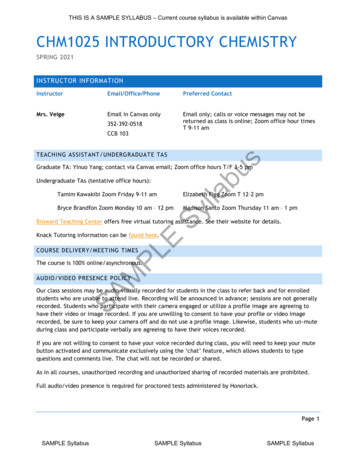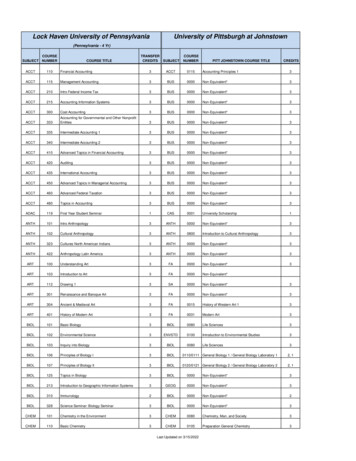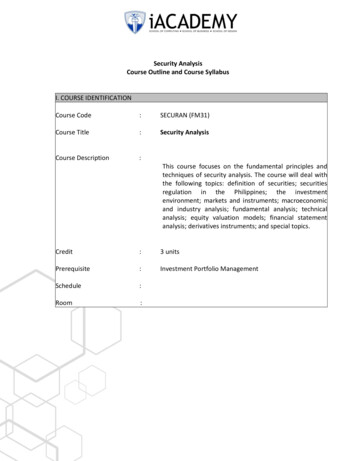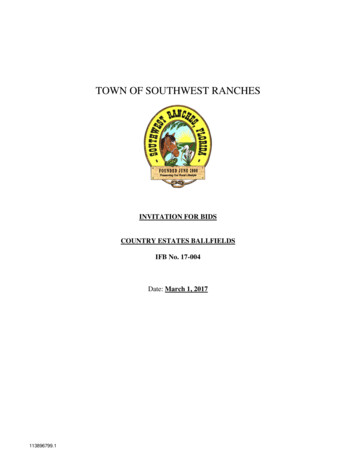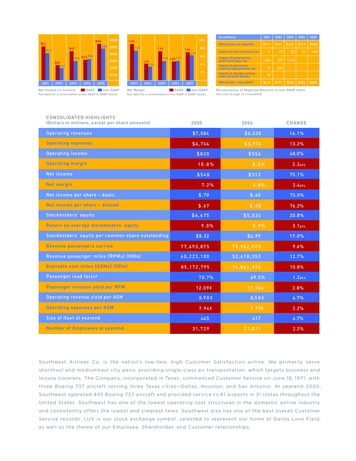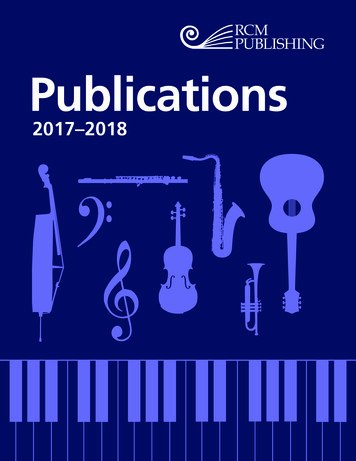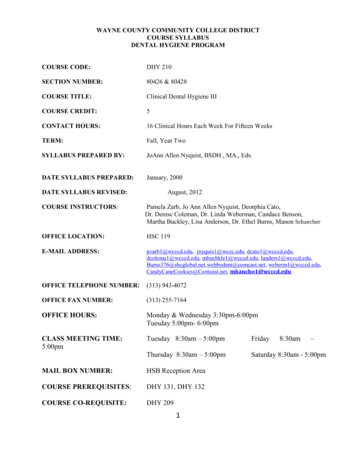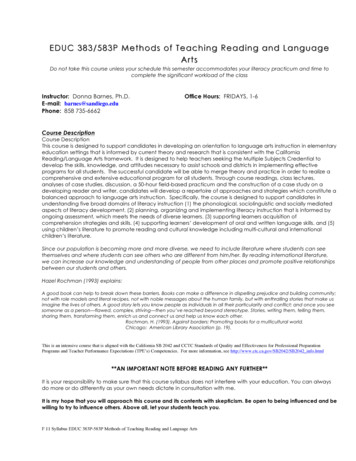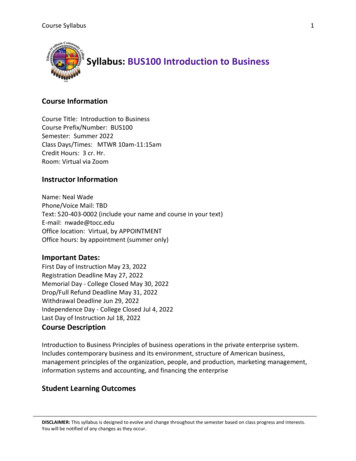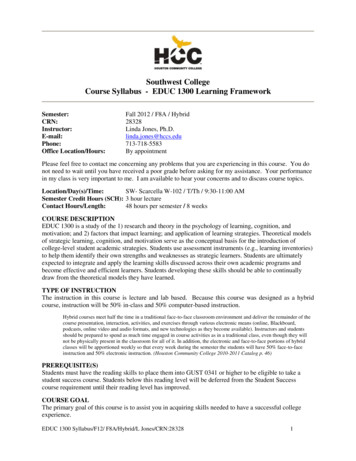
Transcription
Southwest CollegeCourse Syllabus - EDUC 1300 Learning ce Location/Hours:Fall 2012 / F8A / Hybrid28328Linda Jones, Ph.D.linda.jones@hccs.edu713-718-5583By appointmentPlease feel free to contact me concerning any problems that you are experiencing in this course. You donot need to wait until you have received a poor grade before asking for my assistance. Your performancein my class is very important to me. I am available to hear your concerns and to discuss course topics.Location/Day(s)/Time:SW- Scarcella W-102 / T/Th / 9:30-11:00 AMSemester Credit Hours (SCH): 3 hour lectureContact Hours/Length:48 hours per semester / 8 weeksCOURSE DESCRIPTIONEDUC 1300 is a study of the 1) research and theory in the psychology of learning, cognition, andmotivation; and 2) factors that impact learning; and application of learning strategies. Theoretical modelsof strategic learning, cognition, and motivation serve as the conceptual basis for the introduction ofcollege-level student academic strategies. Students use assessment instruments (e.g., learning inventories)to help them identify their own strengths and weaknesses as strategic learners. Students are ultimatelyexpected to integrate and apply the learning skills discussed across their own academic programs andbecome effective and efficient learners. Students developing these skills should be able to continuallydraw from the theoretical models they have learned.TYPE OF INSTRUCTIONThe instruction in this course is lecture and lab based. Because this course was designed as a hybridcourse, instruction will be 50% in-class and 50% computer-based instruction.Hybrid courses meet half the time in a traditional face-to-face classroom environment and deliver the remainder of thecourse presentation, interaction, activities, and exercises through various electronic means (online, Blackboard,podcasts, online video and audio formats, and new technologies as they become available). Instructors and studentsshould be prepared to spend as much time engaged in course activities as in a traditional class, even though they willnot be physically present in the classroom for all of it. In addition, the electronic and face-to-face portions of hybridclasses will be apportioned weekly so that every week during the semester the students will have 50% face-to-faceinstruction and 50% electronic instruction. (Houston Community College 2010-2011 Catalog p. 46)PREREQUISITE(S)Students must have the reading skills to place them into GUST 0341 or higher to be eligible to take astudent success course. Students below this reading level will be deferred from the Student Successcourse requirement until their reading level has improved.COURSE GOALThe primary goal of this course is to assist you in acquiring skills needed to have a successful collegeexperience.EDUC 1300 Syllabus/F12/ F8A/Hybrid/L Jones/CRN:283281
STUDENT LEARNING OUTCOMES (SLO)The student will be able to:1. Construct a personal learning system informed by the research and theory in the psychology oflearning, cognition, and motivation.2. Identify factors that impact learning and apply techniques and strategies to achieve personal, financial,academic, and career success.3. Use technological tools and library resources to acquire information, solve problems and communicateeffectively.4. Develop an educational and career plan based on individual assessments and exploration of options.LEARNING OBJECTIVESStudents will:(SLO #1) Construct a personal learning system informed by the research and theory in thepsychology of learning, cognition, and motivation.1.1 Identify their personal learning style as well as strengths and weaknesses as a strategic learner and apply theirknowledge to classroom learning.1.2 Describe basic theories in the psychology of learning, memory, cognition, and motivation.1.3 Demonstrate the use of learning strategies and study skills.(SLO #2) Identify factors that impact learning and apply techniques and strategies to achievepersonal, financial, academic, and career success.2.1 Explore strategies for adapting to different learning environments and delivery formats.2.2 Identify college resources and their benefits.2.3 Expand financial capabilities by gaining and exercising financial knowledge.2.4 Acquire techniques and skills for personal and professional success.(SLO #3) Use technological tools and library resources to acquire information, solve problems andcommunicate effectively.3.1 Access online college resources and services.3.2 Complete a library orientation.3.3 Use social networking and electronic communications appropriately.(SLO #4) Develop an educational and career plan based on individual assessments andexploration of options.4.1 Identify and file the appropriate degree plan with proper advisement.4.2 Write and prioritize short-term and long-term goals related to your time at Houston Community College.4.3 Explore career options incorporating the use of related assessments and search tools.SCANS or Core Curriculum Statement and Other Standards(L) Students will demonstrate the ability to understand, analyze, and interpret various forms of spokencommunication.(S) Students will demonstrate the ability to communicate orally in clear, coherent, and persuasive languageappropriate to purpose, occasion, and audience.(W) Students will demonstrate the ability to produce clear, correct, and coherent prose adapted to a specificpurpose, occasion, and audience.(CT) Students will demonstrate methods for applying both qualitative and quantitative skills analytically andcreatively to subject matter in order to evaluate arguments and to construct and alternative strategies.EDUC 1300 Syllabus/F12/F8A/Hybrid/L Jones/CRN:238282
EDUC 1300 – TENTATIVE CALENDAR – 8 WEEKS – F8AAgendaWeek 1Course Introduction/Syllabus Overview/Introductory ActivitiesHigher Education TermsChapter 1: Thrive * (Listed as Chapter 3 in the custom edition textbook)Online OrientationSyllabus TestOther Activities/Exercises (as directed by instructor)Week 2SQ3RBloom’s TaxonomyLibrary OrientationChapter 13: Plan* (Listed as Chapter 15 in the custom edition textbook)Career Portfolio IntroductionOther Activities/Exercises (as directed by instructor)Week 3Chapter 2: Prosper* (Listed as Chapter 4 in the custom edition textbook)Chapter 3: Engage* (Listed as Chapter 5 in the custom edition textbook)Chapter 4: Persist* (Listed as Chapter 6 in the custom edition textbook)Career Portfolio (continued)Other Activities/Exercises (as directed by instructor)Week 4Chapter 5: Connect (Listed as Chapter 7 in the custom edition textbook)Chapter 6: Read* (Listed as Chapter 8 in the custom edition textbook)Career Portfolio (continued)Midterm Exam ReviewOther Activities/Exercises (as directed by instructor)Week 5Midterm ExamChapter 7: Prioritize* (Listed as Chapter 9 in the custom edition textbook)Chapter 8: Learn* (Listed as Chapter 10 in the custom edition textbook)Career Portfolio (continued)Other Activities/Exercises (as directed by instructor)Week 6Chapter 9: Record* (Listed as Chapter 11 in the custom edition textbook)Chapter 10: Study* (Listed as Chapter 12 in the custom edition textbook)Career Portfolio DUEOther Activities/Exercises (as directed by instructor)Week 7Chapter 11: Think* (Listed as Chapter 13 in the custom edition textbook)Chapter 12: Communicate* (Listed as Chapter 14 in the custom edition textbook)Other Activities/Exercises (as directed by instructor)Week 8Final ExamLast Day for Administrative/Student Withdrawals:Monday, Oct. 1, 4:30 PM* The chapter enumeration in the custom edition textbook is different than in the 3rd edition. In thecustom edition of the textbook, the content material begins with Chapter 3: Thrive, whereas in the 3rd edition,“Thrive” is listed as Chapter 1.NOTE: The calendar may change. Tests, quizzes, and other assignments (including onlineassignments) may be added. Place a copy of the syllabus and this calendar in your notebook; refer to thecalendar on a daily basis to know what is expected of you. Updated calendars will be distributed, asneeded, in class and/or electronically. Your instructor will give detailed instructions for completing thecareer portfolio as well as what is expected of you regarding online activities.EDUC 1300 Syllabus/F12/F8A/Hybrid/L Jones/CRN:238283
INSTRUCTIONAL METHODSA variety of instructional methods are used throughout the semester. Examples may include classdiscussions, lectures, readings, group projects, research, assessments, video/DVD, Internet searches, andpresentations.As an instructor, I want my students to be successful. I feel that it is my responsibility to provide you withknowledge and opportunities for critical thinking and applications as appropriate.As a student wanting to succeed at your academic and career endeavors, it is your responsibility to do theassigned readings, submit assignments on time, participate in discussions and other activities, attend class(face-to-face and online portions), and enjoy this learning experience as you learn how to use tools forsuccess.STUDENT ASSIGNMENTSAssignments have been developed that will enhance your learning. You will be required to successfullycomplete the following assignments as well as others determined by your professor. Midterm and Final Exams: Each student is required to take midterm and final exams. The examswill cover a variety of materials discussed in class and found in your readings. A study guide foreach exam may be provided by your instructor. You will be given at least one week’s noticebefore an exam. You will have 2 hours to take the final exam. Exam dates are posted in thecourse calendar. Syllabus Test: Teaching and learning are at their best when a partnership is formed between theteacher and the learner. Think of the syllabus as a “contract” between the professor and student.As such, it is critical that you understand and know the content of the document. You will take asyllabus test, as well as sign an acknowledgment that the professor provided a copy of thesyllabus and/or explained how to access the syllabus. Regular Quizzes/Tests: To ensure that each student is mastering the materials assigned forreading and discussion in class, quizzes/tests will be administered following select chapters. Projects and Exercises: During the course of the semester, each student will be asked to completea variety of projects that support lecture and reading materials. Projects/Exercises may include:library orientation, online assignments, critical thinking exercises, collaborativework/presentations, career research and reporting, journaling, oral presentations, and otherprojects assigned by your professor. Career Portfolio: Students are required to assemble a career portfolio that showcases his or herchosen career and includes various professional artifacts, including a cover letter and resume. Thespecific format and required elements of the portfolio will be explained in class and/or postedelectronically.LATE ASSIGNMENTSYour grade reflects your efforts and achievements. Late work does not reflect good efforts. If you have atrue emergency and cannot turn in an assignment on time, contact the professor as soon as possible todiscuss the issue. Some emergencies are unavoidable; therefore, some late work may be accepted at theprofessor’s discretion and may include point deductions.EDUC 1300 Syllabus/F12/F8A/Hybrid/L Jones/CRN:238284
STUDENT ASSESSMENTSKnowledge checks may occur in the format of quizzes, projects, assignments, papers, or exams. Studentsare also required to complete a Learning and Study Skills Inventory (LASSI) to be used in the mandatoryadvising component of the class.INSTRUCTOR REQUIREMENTSAs your instructor, it is my responsibility to: Provide the grading scale and detailed grading formula explaining how student grades are to bederived Facilitate an effective learning environment through class activities, discussions, and lectures Description of any special projects or assignments Inform students of policies such as attendance, withdrawal, tardiness and make up Provide the course outline and class calendar which will include a description of any specialprojects or assignments Arrange to meet with individual students before and after class as neededTo be successful in this class, it is your responsibility to: Attend and be on time for class Participate in class discussions and activities Read and comprehend assigned textbook and other readings Complete the required assignments and exams Ask for help when there is a question or problem Keep copies of all paperwork, including this syllabus, handouts, and all assignmentsPROGRAM/DISCIPLINE REQUIREMENTSYou will be required to complete the Financial Literacy & Capabilities Survey, declare your major,populate your student planner with the appropriate courses, and meet with your assigned advisor duringthis course.HCC Grading ScaleA 100 – 90 4 points per semester hourB 89 – 80 . . .3 points per semester hourC 79 – 70. . .2 points per semester hourD 69 – 60. . .1 point per semester hourF 59 and below . .0 points per semester hourFX (Failed due to non-attendance). .0 points per semester hourIP (In Progress) . .0 points per semester hourW (Withdrawn) . . .0 points per semester hourI (Incomplete) .0 points per semester hourAUD (Audit) .0 points per semester hourFX is the assigned grade if a student stopped attending class and fails to withdraw prior to the last officialday for withdrawals for the semester. The instructor will note the last day the student attended the classfor record. The grade of FX cannot be changed once assigned.W (Withdraw/Drop) No grade is given. Only six W’s are allowed. Before dropping a course,be sure you understand the following information. Under Section 51.907 in the Texas Education Code,“an institution of higher education may not permit a student to drop more than six courses, including anycourse a transfer student has dropped at another institution of higher education.” This statute applies tostudents who enroll in a public institution of higher education as a first-time freshman in fall 2007 orlater.EDUC 1300 Syllabus/F12/F8A/Hybrid/L Jones/CRN:238285
IP (In Progress) is given only in certain developmental courses. The student must re-enroll to receivecredit. COM (Completed) is given in non-credit and continuing education courses. To compute gradepoint average (GPA), divide the total grade points by the total number of semester hours attempted. Thegrades “IP,” “COM” and “I” do not affect GPA.In the event of an “I”, students must arrange with the instructor to complete the course within 6 months orthe I converts to an F). Grades are available online within one week of the end of the course on thewebsite www.hccs.edu. Students needing an official copy of their grades for reimbursement, etc., mayrequest a copy from the Office of Student Records at the System Administration Building.GRADING CRITERIAYour instructor will conduct quizzes, exams, and assessments that you can use to determine howsuccessful you are at achieving the course learning outcomes (mastery of course content and skills)outlined in the syllabus. If you find you are not mastering the material and skills, you are encouraged toreflect on how you study and prepare for each class. Your instructor welcomes a dialogue on what youdiscover and may be able to assist you in finding resources on campus that will improve yourperformance.STUDENT ASSESSMENTS AND GRADING PERCENTAGESParticipation (attendance, punctuality, exercises, online assignments, discussions, etc.)Career PortfolioTests/Quizzes/Midterm Exam/Course NotebookFinal ExamTOTAL35%25%20%20%100%GRADE REPORTSHCC does not mail out grade reports. Students may view their grades online at www.hccs.edu within oneweek of the end of the course. Students who require a paper or hard copy of their grades may request acopy from the Office of Student Records.INSTRUCTIONAL MATERIALS Textbook: Sherfield, R. M., & Moody, P. G. (2013). Student success and career development: Acustom edition for Houston Community College. Boston: Pearson.OR Textbook: Sherfield, R.M., & Moody, P.G. (2012). Cornerstones for Career College Success.(3RD ed.). Boston: Pearson. Online Student Access Code (MyStudentSuccessLab, packaged with new textbooks purchasedat a campus bookstore; access code may also be purchased online) Online Course ID for MyStudentSuccessLab: (To be announced in class)You will need both the Student Access Code and the Course ID to create your online account. Additional Supplies Three-ring binder Tabbed dividers (at least four) One report cover or portfolio (for the Career Portfolio project) Paper, pens, and pencils (pencils are required for scantron use.) One package GREEN scantronsEDUC 1300 Syllabus/F12/F8A/Hybrid/L Jones/CRN:238286
HCC POLICY STATEMENTSAccess Student Services Policies on their Web site:http://hccs.edu/student-rightsACADEMIC HONESTY: Students are responsible for conducting themselves with honor and integrity infulfilling course requirements. Penalties and/or disciplinary proceedings may be initiated by CollegeSystem officials against a student accused of scholastic dishonesty. Scholastic dishonesty includes, but isnot limited to, cheating on a test, plagiarism, and collusion.Cheating on a test includes: Copying from another student’s test paper; Using materials during a test that are not authorized by the person giving the test; Collaborating with another student during a test without authority; Knowingly using, buying, selling, stealing, transporting, or soliciting in whole or partthe contents of an un-administered test; and Bribing another person to obtain a test that is to be administered.Plagiarism means the appropriation of anther’s work and the unacknowledged incorporation of that workin one’s own written work offered for credit.Collusion means the unauthorized collaboration with another person in preparing written work offered forcredit.Because an important part of being a college student is academic honesty, it is the expectation in thiscourse that you will complete all academic work without cheating, plagiarism, lying and/or bribery, andcollusion. Penalties for academic dishonesty may include receiving a zero for the assignment, failing thecourse, and/or being suspended or dismissed from the college (see HCC student handbook).In this course, if one student allows another to copy or otherwise “cheat” from his or her work, bothstudents will receive a zero for the assignment, and they may be asked to leave class for the day.ATTENDANCE: You are expected to attend all lecture classes and labs regularly. Student success incollege is largely dependent on attending class. There is no such thing as an excused absence.Attendance is checked daily. Schedule your personal appointments outside of class time, if at all possible.You are responsible for materials covered during your absences. Instructors may be willing to consultwith you for make-up assignments, but it is your responsibility to contact the instructor. Although it isyour responsibility to drop a course for nonattendance, the instructor has the authority to drop you forexcessive absences. You may be dropped from a course after accumulating absences in excess of 12.5percent of the total hours of instruction (lecture and lab). For example: For a three credit-hour lecture class meeting three hours per week (48 hours of instruction), youcan be dropped after six hours of absence.For a four credit-hour lecture/lab course meeting six hours per week (96 hours of instruction), youcan be dropped after 12 hours of absence.Departments and programs governed by accreditation or certification standards may have differentattendance policies. Administrative drops are at the discretion of the instructor. Failure to withdrawofficially may result in a grade of “F” or “FX” in the course.EDUC 1300 Syllabus/F12/F8A/Hybrid/L Jones/CRN:238287
Additionally, in this class: Tardiness (arriving late) interrupts instruction and learning. If you are tardy three (3) times, itmay count as one absence. Therefore, repeated tardiness may result in your being dropped fromthe course, or if not dropped, a reduction in your total average points for the course. Arrivingmore than ten minutes late will be counted as an absence. Leaving early interrupts instruction and learning and may be counted as an absence or as beingtardy. Whether you are absent or present, it is your responsibility to keep informed of assignments,test dates, and matters that affect your participation in this course and on this campus. If you areabsent, please consult your classmates, course calendar, and any online course resources to findout what you missed, instead of asking the professor, “Did I miss anything? “ or “What did Imiss?” If you are absent or late and miss an in-class activity or quiz, the points for those activities andquizzes may not be made up. If you arrive late for an exam/quiz, extra time to complete theexam/quiz will not be allowed. Tests may be made up within one week of the testing date in thecampus Testing Center. Make-up tests (exams) may be different from the original examadministered in class. Repeated absences and/or tardiness will affect your overall course average. Consecutive absences may result in a lower grade for the course, failing the course, or beingdropped from the course. As this is a hybrid course, you are required to log in to the assigned online system, completeassignments, and participate in discussions weekly. It is suggested that you commit atleast three hours a week to the class. Attendance will be recorded based on yourparticipation in weekly assignments/discussions.NOTE: Circumstances may arise related to illness, family, childcare, transportation, and court/legalissues. Any circumstances that may require an exception to this attendance policy must be discussed withthe professor. Please make every effort to discuss circumstances that affect your attendance BEFOREhand, rather than after the fact. Just prior to class is not enough notice—and it is not the appropriatetime—to discuss an exception to the attendance policy. Waiting until mid or late in the semester todiscuss extenuatingWITHDRAWALS: Students may withdraw from courses prior to the deadline established by theinstitution. Before withdrawing from a course, students should meet with the instructor to discuss thedecision. There are services available to students to assist in completion and success in the course.Deadlines to withdraw are printed in the schedule of classes and on the HCC website. Be sure you adhereto the rules and deadlines in order to receive a ‘W’ otherwise a grade of ‘F’ will be given in the course bythe instructor. Students should take care in dropping a course, as the third or future attempt to retake acourse will result in a higher rate of tuition at HCC. Remember to allow a 24-hour response time whencommunicating via e-mail and/or telephone with a professor and/or counselor. Do not submit arequest to discuss withdrawal options less than a day before the deadline. If you do not withdrawbefore the deadline, you will receive the grade that you are making in the class as your final grade.**FALL 2012 – LAST DAY TO WITHDRAW – OCTOBER 1ST , 4:30PM**EDUC 1300 Syllabus/F12/F8A/Hybrid/L Jones/CRN:238288
CLASSROOM BEHAVIOR/CONDUCTYou are in college. You will be treated and respected as an adult. Because of the nature of discussioninvolved in this class, it is imperative that we respect each other’s opinions and values. Classroomdisruptions interfere with the learning environment and cannot be allowed. Any student failing to abide byappropriate standards of conduct during scheduled College activities may be asked to leave that day’sclass or activity by the instructor or another College official. (The student has the right to return to thenext class/activity.) If a student refuses a request to voluntarily leave the classroom, security may besummoned to remove the student so that the scheduled activity may resume without further disruption. Incases of serious problems, the faculty member will document and report the incident to his/her supervisor.Further disciplinary action may be pursued according to System guidelines, presented in the HCCSStudent Handbook.In addition to cooperative and courteous behavior, follow these guidelines: Arrive to class on time and stay for the entire session. Tardiness and leaving early are disruptionsto class. Turn off or silence cell phones* and other electronics prior to entering class. No calls, textmessages, photographs, or any other electronic communication should be sent or received duringclass. A ringing cell phone may result in your being asked to leave class. Using your cell phoneduring class will likely result in your being asked to leave class and in your receiving a zero gradefor the day, even if grades were not taken for that day.NOTE: If you have a home, family, or work situation that requires you to keep a cell phone onhand, please discuss this with the professor beforehand. Obtain the instructor’s approval before using a laptop or other electronic device during class. Get handouts and returned work before class begins or after class ends. DO NOT walk up to theinstructor during class. Stay awake in class—no heads on desks. Please do not chat or visit with classmates during class unless you are asked to discuss classcontent. “Side” conversations interrupt the learning environment and show disregard for ourfellow colleagues. No food in class. Beverages with lids are allowed except in the computer labs. *More information on the use of cell phones and other classroom demeanor will be discussed inclass.***For repeated classroom disruptions, a student may be dropped from this course.You are responsible to familiarize yourself with the policies, procedures, and other information in theHCC Student Handbook. It may be found online through the HCC Web site.Access Distance Education (DE) Policies on their Web site:All students are responsible for reading and understanding the DE Student Handbook, which containspolicies, information about conduct, and other important information. For the DE Student Handbook clickon the link below or go to the DE page on the HCC website.The Distance Education Student Handbook contains policies and procedures unique to the DE student.Students should have reviewed the handbook as part of the mandatory orientation. It is the student'sresponsibility to be familiar with the handbook's contents. The handbook contains valuable information,answers, and resources, such as DE contacts, policies and procedures (how to drop, attendancerequirements, etc.), student services (ADA, financial aid, degree planning, etc.), course information,testing procedures, technical support, and academic calendars. Refer to the DE Student Handbook byvisiting this link:http://de.hccs.edu/de/de-student-handbookEDUC 1300 Syllabus/F12/F8A/Hybrid/L Jones/CRN:238289
Access Continuing Education (CE) Policies on their Web :A Sr. Advisor is connected to this class section and will meet with the class within the first two weeks ofclass. The Sr. Advisor will review the advising syllabus and the ways in which you can communicate withthem. Students are required to meet with their advisor at least twice within the semester. Participation inthese advising sessions is required and will be a part of the grade in this success class.Useful Web Resources: Information: Career Information: www.hccs.edu ; http://learning.hccs.eduhttp://bls.gov/OCO ; www.acinet.org ; www.careerbuilder.comwww.monster.com ; www.careerpath.comCareer Assessment: www.typefocus.comTutoring & Support: www.hccs.askonline.net ; http://mystudentsuccesslab.comE-MAIL / PHONE COMMUNICATIONYou need to access and regularly check your HCC e-mail. Also, keep your professors informed of changesin any alternate e-mail addresses or phone numbers you have given them. On occasion, announcements,assignments, and/or schedule changes or other matters may need to be communicated through e-mail. If you email or call your professors, identify the course number/day/time and identify yourself by the name youuse for the official rolls. Thank you!HCC MISSION STATEMENTThe Houston Community College is an open-admission, public institution of higher education offeringopportunities for academic advancement, workforce training, career development, and lifelong learning thatprepare individuals in our diverse communities for life and work in a global and technological society.ACADEMIC DEMEANORThe following quote appears in the EDUC 1300 textbook (Sherfield & Moody, 2013):By attending your college of choice, you have agreed to become part of its community, values,and policies. You now have the responsibility to stand by its code of academic and moralconduct, and you have the responsibility to give your very best to every class and organization inwhich you are involved. And you have a responsibility to YOURSELF to approach this newworld with an open mind and curious enthusiasm. (p. 36).Special Note: The instructor reserves the right to make changes to the course syllabus and calendar. Youwill be notified of any changes in writing either in class or electronically. Additional and/or updatedsyllabus information, instructor requirements, and other course information may be distributed in class.You are responsible for obtaining this information. Therefore, if you are absent when writtenadditions/changes or handouts are distributed in class, it is your responsibility to obtain those itemsdistributed during your absence(s).I look forward to meeting you and to your participation in the class.EDUC 1300 Syllabus/F12/F8A/Hybrid/L Jones/CRN:2382810
EDUC 1300 Syllabus/F12/ F8A/Hybrid/L Jones/CRN:28328 1 Southwest College Course Syllabus - EDUC 1300 Learning Framework Semester: Fall 2012 / F8A / Hybrid CRN: 28328 Instructor: Linda Jones, Ph.D. E-mail: linda.jones@hccs.edu Phone: 713-718-5583 Office Location/Hours: By appointment Please feel free to contact me concerning any problems that you are experiencing in this course.

